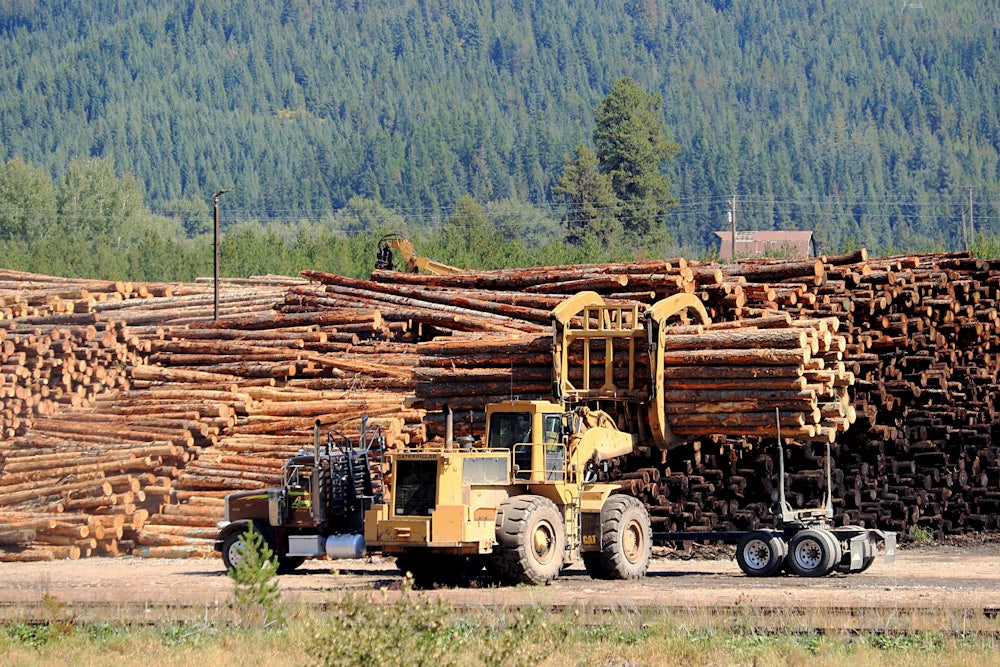The Fix Our Forests Act, which breezed through a House vote last week, represents a “return to common sense,” according to Speaker Mike Johnson. “The reason this is so important is because we see what happened in California,” Johnson said. The recent wildfires that have left at least 26 dead and nearly 15,000 structures destroyed, he has also suggested, are partly the fault of “water resource mismanagement, forest management mistakes, all sorts of problems,” which should be fixed before those suffering receive further federal aid.
The Fix Our Forests Act would allow loggers to more easily thin forests by reducing environmental regulations and public input. The thinking is that reducing tree counts means reducing wildfire fuel. Yet environmental groups including Sierra Club and Earthjustice say that the bill would cause more fires, not fewer.
FOFA is “a trojan horse for Republicans to weaken environmental law to serve industry interests,” Earthjustice’s Blaine Miller-McFeeley told me. Miller-McFeeley’s view of the bill as a gift to logging companies echoes the position of many prominent environmental groups. Last week, more than 130 environmental organizations co-signed a letter observing that FOFA’s “sweeping provisions remove scientific review and accountability to benefit the short-term interests of extractive industries.” The Republican co-author of the bill, Representative Bruce Westerman of Arkansas, received more than $160,000 in campaign contributions from the forestry industry in 2023 and 2024, according to Open Secrets.
Some experts told me that the basic logic behind the bill could actually lead to more severe burns. Tim Ingalsbee, executive director of Firefighters United for Safety, Ethics, and Ecology, or FUSEE, told me that scaling up logging in the wilderness, where uncontrolled blazes can stomp through small towns on their way to the exurbs, would leave behind the most flammable materials. “Grasses, shrubs, leaves, small trees, old logging slash: These are the things that the timber industry will never ever remove,” he says. “They have no commodity value. When they wanna do logging, they remove the least flammable portion of a tree and dump all the needles and limbs on the ground where it’s basically tinder.” In fact, the best wildfire mitigators are often the trees themselves. Old-growth forests are able to survive and slow the spread of flames—and their numbers are dwindling due to logging.
Further, the most dangerous fires—the ones that threaten densely populated areas—rarely begin deep in the woods. For example, the Los Angeles firestorms “originated in very brushy areas just outside of town, then became an urban configuration issue,” said Ingalsbee. “No amount of logging would have saved anything—it’s this spurious connection.”
FOFA’s provisions would allow the U.S. Forest Service to skip regulatory steps that are typically required when clearing out federally owned forest land. When a parcel of federal land might need to be altered—say, by the installation of utility lines—agencies like the Forest Service can use a designation called “categorical exclusion” to forgo time-consuming steps like conducting sustainability analyses or soliciting community input, if the alteration is unlikely to impact populated environments. The bill expands the range of certain types of categorical exclusions from 3,000 and 4,500 acres to 10,000 acres—nearly the size of Manhattan. Additional provisions in the bill allow agencies like the Forest Service to conditionally delay environmental review for logging projects until after they’re finished and reduces the statute of limitations combating such projects in court to 120 days after they’ve been announced.
Those provisions would make it easier than ever for logging companies to appeal to the Forest Service for permission to chop through federal land—with little public notice or consideration for environmental reproductions, and a window for legal recourse that closes in the blink of an eye. “The agency, with the timber industry as their puppet master, will be able to do whatever they want and as fast as they want,” Miller-McFeeley says.
To the bill’s authors, that assertion couldn’t be further from the truth. According to Paul Iskajyan, senior adviser to Scott Peters, the bill’s Democratic co-author, tree-thinning “is a tool in the tool belt that will help prevent some fires. It will be up to the experts using the best available science and data, in accordance with the law and strong environmental guardrails, to determine when to use them.” Over email, Iskajyan added that the bill contains a number of other wildfire solutions, such as enhancing interagency collaboration to fight fires and investment in research and development.
The bill’s opponents aren’t convinced. “Coordination is great. So is research and development around advancing tech for wildfire detection and those sorts of things. All of those are fine, and standing alone we’d be more than supportive of those,” Miller-McFeeley said. “They are being used to dress up a problematic, destructive bill.”
Jared Huffman, another Democrat from California, has a competing bill under consideration to address wildfires, the Community Protection and Wildfire Resilience Act, which has endorsements from such groups as Sierra Club and Earthjustice. At the center of Huffman’s own bill, co-authored with California Republican Jay Obernolte, is a series of financial incentives to help communities draft their own wildlife resilience plans, which would include identifying “defensible space” against fires and strengthening communication with state agencies.
Huffman denounced FOFA from the House floor on Thursday. “Wildfire is deadly serious,” he said. “It’s not something politicians should use as a pretext to jam through unrelated industry favors or special interest agendas that undermine our foundational environmental protections.” The good parts of the bill, he argued, “are totally unfunded.” Instead of addressing “the key driver of catastrophic wildfires,” i.e., climate change, he said, the bill “inappropriately co-opts emergency authorities under the National Environmental Policy Act, undercuts the Endangered Species Act, and even makes it more difficult for communities to engage and scrutinize or even know about projects that could directly impact them.”
Despite Huffman’s broadsides, 64 Democrats joined the Republican majority in passing FOFA through the House. Meanwhile, Huffman’s wildfire bill, which he reintroduced last week after it faltered in the previous congressional session, awaits its time on the floor.








